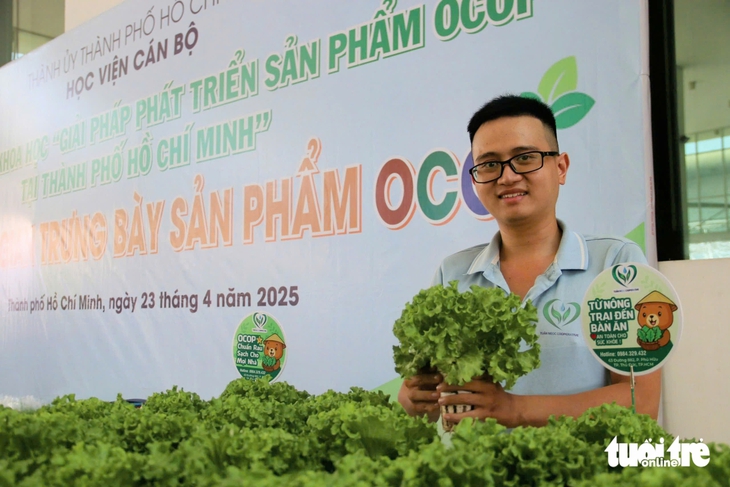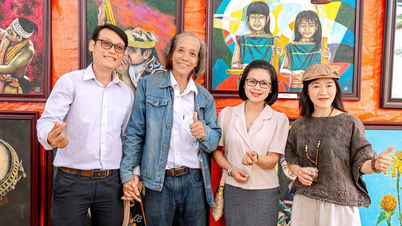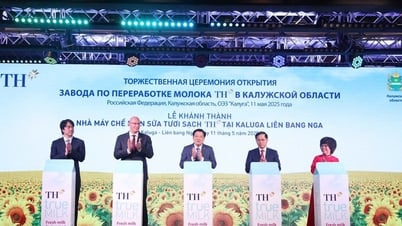
By mid-2024, Ho Chi Minh City will have 191 products recognized as OCOP - Photo: BUI NHI
On the morning of April 23, Ho Chi Minh City Academy of Officials held a scientific workshop "Solutions for developing OCOP products in Ho Chi Minh City".
At the conference, Associate Professor Dr. Vuong Duc Hoang Quan - Deputy Director of the Institute of Occupational Safety and Hygiene - commented that the number of OCOP products in Ho Chi Minh City is still small compared to other provinces and cities.
The conference report said that by mid-2024, Ho Chi Minh City had 191 OCOP products. Of these, 79 products achieved 4-star quality, 112 products achieved 3-star quality and no products achieved 5-star quality.
Ms. Hoang Thi Mai - Head of the Department of Cooperative Economics (under the Department of Natural Resources and Environment of Ho Chi Minh City), informed that recently, besides the advantages, the OCOP program in Ho Chi Minh City also faced many difficulties.

Ms. Hoang Thi Mai talks about the advantages and difficulties in the implementation of the OCOP program in recent times in Ho Chi Minh City - Photo: BUI NHI
Specifically, a product recognized as a 5-star OCOP must be associated with a large raw material area. However, in Ho Chi Minh City, the urbanization rate is quite high, and the typical raw material area is increasingly narrow.
Some ward and commune officials still have barriers in supporting local businesses in developing OCOP products.
Besides, small and medium enterprises are still hesitant to apply for OCOP standards. Currently, there is no separate policy to develop OCOP products and it is integrated into the general policies of the city.
Faced with these realities, Mr. Nguyen Minh Nhut - Deputy Head of the Culture - Society Committee, Ho Chi Minh City People's Council - proposed a number of solutions to overcome and develop the program. First of all, Ho Chi Minh City needs to set a goal of strengthening regional linkages in the supply of raw materials for OCOP products and providing financial support and tax incentives for these businesses.
Another important point is to apply technology in the production process including processing and preservation. OCOP products must improve quality and standardize according to international standards to access the international market. Promoting the brand and expanding consumption channels also need attention.
In addition, businesses need to constantly improve the quality of human resources, have knowledge of technology and international standards, aiming to meet the increasingly demanding needs of domestic and foreign customers.
Expanding the OCOP concept
Associate Professor, Dr. Vuong Duc Hoang Quan assessed that the OCOP concept in Vietnam has been expanded and flexibly followed local development practices.
The program is not only limited to poverty reduction but also a general economic development model.
In addition to agricultural products, OCOP also expands to non-agricultural or service sectors, linking this program with community tourism development with the aim of enhancing the value of local products.
https://tuoitre.vn/tp-hcm-con-it-san-pham-ocop-202504231454446.htm



![[Photo] General Secretary To Lam concludes visit to Russia, departs for Belarus](https://vphoto.vietnam.vn/thumb/1200x675/vietnam/resource/IMAGE/2025/5/11/0acf1081a95e4b1d9886c67fdafd95ed)


![[Photo] National Assembly Chairman Tran Thanh Man attends the Party Congress of the Committee for Culture and Social Affairs](https://vphoto.vietnam.vn/thumb/1200x675/vietnam/resource/IMAGE/2025/5/11/f5ed02beb9404bca998a08b34ef255a6)
















![[Photo] Discover the beautiful scenery of Wulingyuan in Zhangjiajie, China](https://vphoto.vietnam.vn/thumb/1200x675/vietnam/resource/IMAGE/2025/5/11/1207318fb0b0467fb0f5ea4869da5517)






















































Comment (0)